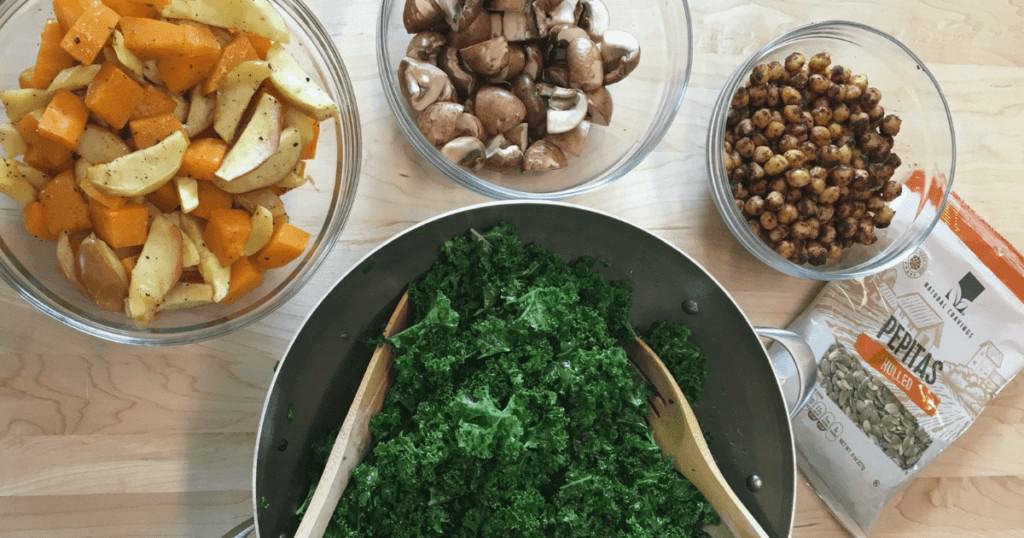The list you scribbled in the car five minutes ago rests between your fingers and the grocery cart’s handlebar as you embark on what you hope will be a quick grocery run. As the produce section starts to feel like a corn maze and the frozen aisle makes your brain freeze, you wonder how people manage to conquer this meal-prep thing weekly. If this sounds like your typical grocery run, then these dietitian-approved meal-prep tips might be for you.
- Understand the value. Before heading to the store, you should recognize that cooking meals is about self-care, says Julie Duffy Dillon, a North Carolina-based registered dietitian and eating disorder specialist. She adds that meal-prepping should not be stressful. “It’s compassionate to you and your family,” Dillon explains.And being organized about meals can help you reach your nutritional goals, Claire Chewning, an R.D. and blogger located in Virginia, said. “You have to align your actions with your intentions.”
- Plan strategically. “Meal-prep doesn’t have to take place on Sunday afternoons,” Rachel Meltzer Warren, a New York-area R.D. and nutrition writer says, though many find that to be a convenient time. Using grocery delivery apps and preparing food in increments can help you “carve out time in a busy schedule,” she adds. It’s also helpful to “know when your energy is,” University of Maryland’s campus dietitian, Jane Jakubczak, says, laughing while explaining that she makes salmon at 6 a.m.
- Shop smart. Having a general idea of the foods you want to purchase can minimize food waste, Warren says. She advises clients to fill out grids – which become grocery lists – when mapping out meals for the week. “I know I have big eyes when I shop,” Warren says, chuckling. “If I have no plan, I grab everything, and [then] the food goes bad.”
Meal Planning on the Fly
To stay on track when shopping while still allowing room for creativity, Chewning considers each meal as a triangle; it’s three points are the macronutrients. “At every meal, if you want full balance to keep you satiated and to keep all the little cells in your body happy, you have a protein, you have a carbohydrate and a healthy fat,” she said. “In the center of the triangle, you have a big empty space, and that’s where fruits and vegetables come in.”
The carbohydrate sources Chewning, a lacto-ovo vegetarian, enjoys include rice, potatoes, peas, beans and corn. For protein, she likes tofu, seitan and fish prepared in olive oil, a healthy fat. “If I plan to have those foods cooked, it gives me the freedom and the ease to eat them in a way that sounds good to me at that moment in time,” Chewning said.
Jakubczak purchases salmon, chicken and lean meats in bulk, the cheapest option per-unit, she says. After cooking proteins on Sundays, she portions them into labeled containers and freezes them – essentially “creating [her] own frozen food.” She takes the containers out to thaw and uses a microwave to accelerate defrosting before mealtimes. “If we don’t plan and prep in advance, it’s almost too easy to get take-out,” Jakubczak says. “Make the healthy option the easy option.”
- Plan for chaos. A busy schedule shouldn’t stop you from consuming balanced meals and snacks. Dillon plans to cook two longer-to-prepare recipes, two 15-minute recipes and one “super easy” recipe weekly, for nights when “life happens.” Warren keeps frozen riced cauliflower on hand to fry with tofu and eggs for times when she lacks fresh ingredients. Jakubczak bags vegetables and portions watermelon into containers in advance so she can grab them on busy mornings. “Prepare to be unprepared,” Warren says. “Have ideas that can be thrown together without much prep.”
- Make it simple. “In the end, having canned peas versus fresh peas isn’t going to make a difference,” Dillon says. “If you can try not to be too [much of a perfectionist] or all-or-nothing, then you will be able to be honest with where you are now. Then you’ll be able to start cooking.”
 Dena Gershkovich is a dietetics and journalism double major at the University of Maryland, College Park. She is hoping to become a registered dietitian and nutrition writer. To read more of Dena’s work, check out her blog, The Artsy Palate, for original recipes and tips for how to stay healthy in college and beyond.
Dena Gershkovich is a dietetics and journalism double major at the University of Maryland, College Park. She is hoping to become a registered dietitian and nutrition writer. To read more of Dena’s work, check out her blog, The Artsy Palate, for original recipes and tips for how to stay healthy in college and beyond.

